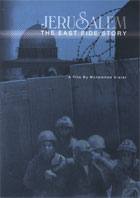
Jerusalem: The East Side Story 2008
Distributed by Jerusalem East Side Story
Produced by Palestinian Agricultural Relief Committees (PARC); Executive Producer Terry Boullata
Directed by Mohammed Alatar
DVD, color, 57 min.
Jr. High - Adult
Human Rights, Political Studies, Middle East, Multiculturalism and Diversity Studies, Palestine, Israel, Sociology, Nationalism
Date Entered: 05/20/2011
Reviewed by Malcolm L. Rigsby, Department of Sociology, Ouachita Baptist University, Arkadelphia, ARMohammed Alatar’s film, Jerusalem: The East Side Story is a stark portrayal of peoples, tensions, and cries for order, freedom, and equality!
Sometimes hegemonic and other times with direct force, director Mohammed Alatar takes the viewer on a journey of indigenous survival. The goal of this journey does not seem to seek to create bitterness; rather it seems to seek to awaken the viewer, to disturb, and to press the world to consider the concept of “occupation”. In a world that seeks democratic processes this film is a prime example of the cry for balance of order, freedom, and equality.
When conducting a review of a documentary one of the last things I do is check to see how much exposure the film has experienced in the U.S. Sadly, I must report that this excellent film has apparently had little review or screening in the U.S. This documentary complements Alatar’s earlier landmark film entitled The Iron Wall. A review of this film is provided at the Educational Media Reviews Online (EMRO) database supported by the University of Buffalo libraries.
Mohammed Alatar, an excellent director, uses his skills to incorporate 110 years of Palestinian/Israeli history in a vivid, emotional, and stark portrayal of the current socio-political issues that continually interplay in this region of the world. More importantly, it is this volatility, especially since 1948, that translates to the rest of the world. The question arises: as long as there is not peace and cooperation for coexistence in Jerusalem can there be peace in the world we live in today? As I considered the film, it became apparent to me that many tensions and issues surrounding Palestine and Israel remain unresolved due to an uneducated world; its people. Alatar takes a monumental step in addressing this lack of knowledge as he takes the viewer on a tour of shots in the dark, checkpoints, settlements, village and town demolitions, confrontations, and found and lost dreams cherished by both the Israeli and Palestinian people. Perhaps the outcome sought for this film is to bring the viewer to a state of reality and desire to investigate the facts further. This challenging film will certainly invigorate and impress upon each viewer, the need to seek knowledge and answers about these human relationships.
Filming, both audio and video, is well done. Extraordinary editing must be commended in helping to bring the many interviews into context with the graphs, maps, and other footage. For personal home viewing, this documentary is modestly priced at $25.00, through the film's website.
Viewing suggestions include The Iron Wall (2006).